Coronavirus in Scotland: What can I now do - and what are the rules?
- Published
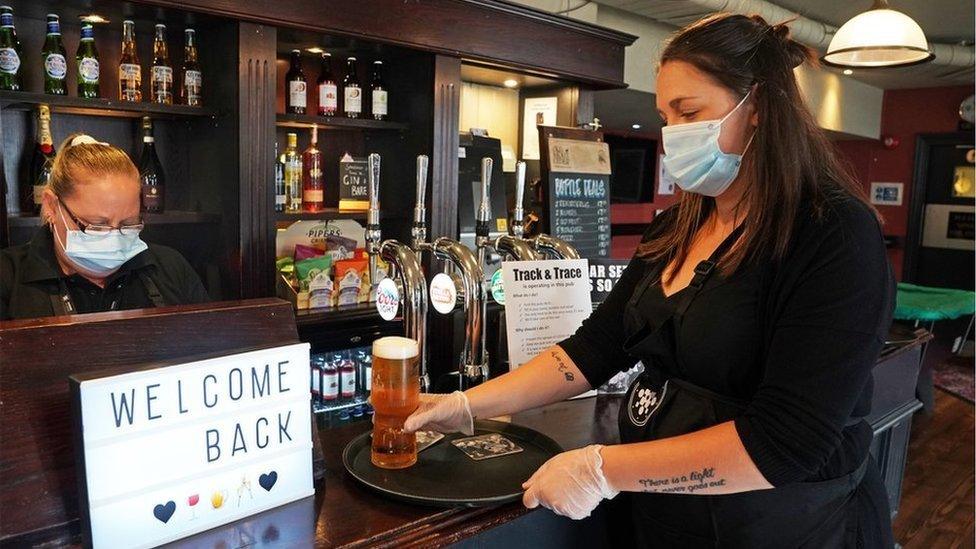
Pubs in England reopened on 4 July - with precautions - as lockdown restrictions were eased south of the border
Phase 3 of Scotland's route map out of lockdown begins its most eagerly awaited chapter on Wednesday as pubs, restaurants, hairdressers and barbers are allowed to reopen.
The measures follow recent developments such as the introduction of compulsory face coverings in shops and the lifting of restrictions on meeting people from other households indoors.
So what can we now do - and what are the rules?
What changes on Wednesday 15 July?
Indoor pubs, cafes and restaurants can reopen for the first time in almost four months.
They can seek an exemption from the 2m distancing rule, but will have to warn customers that they are entering a 1m zone, produce revised seating plans, and improve ventilation.
Hairdressers and barbers will be able to reopen with enhanced hygiene measures.
Guidance on physical distancing will have to be followed, and customers will be asked to provide their contact details.
All holiday accommodation can reopen, as can museums, galleries, cinemas, monuments and libraries - although not all such venues will open immediately.
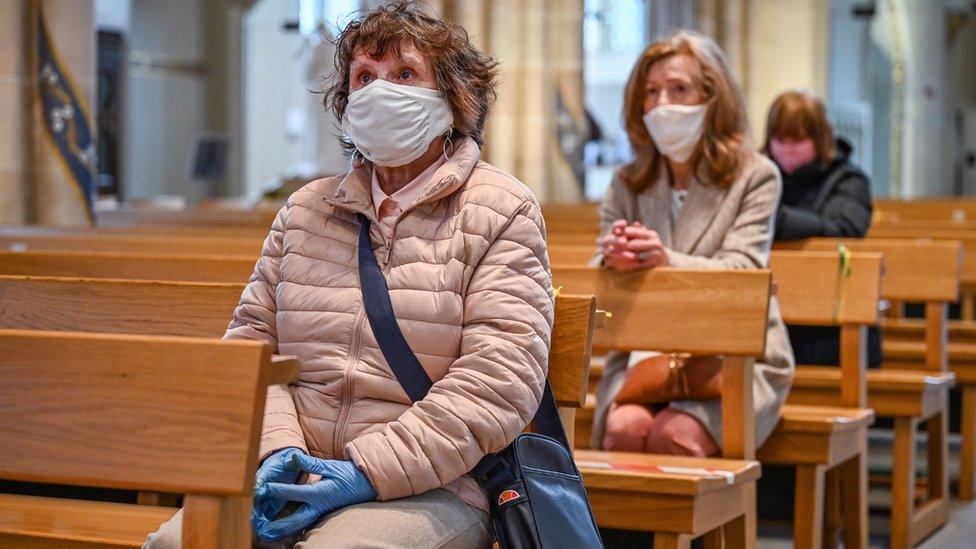
Places of worship have reopened for individual prayer
Places of worship can also now reopen for communal prayer and services, although numbers will be limited to 50, singing and chanting will be restricted and those attending will be asked for their contact details.
Restrictions on attendance at services and ceremonies for funerals, weddings and civil partnerships have been eased.
The childcare sector can fully reopen.
What has already changed under Phase 3?
Since 10 July, up to eight people from a maximum of three different households have been allowed to meet indoors - and can stay overnight as long as there is physical distancing between different households.
People should stay two metres from people in other households, clean surfaces after touching them, and wash their hands regularly.
Up to 15 people from five different households can meet outdoors, while also following the 2m distancing rules.
Adults are being advised not to meet people from any more than four different households in one day.
People who are part of a non-cohabiting couple no longer need to stay physically distant from each other, indoors or outdoors.
In addition, people who are shielding do not have to distance themselves from others living in the same house.
Children aged under 12 no longer have to physically distance from other people indoors. Young people aged 12 to 17 still need to obey distancing rules, but there is no longer a limit on the number of different groups they can meet during a day.
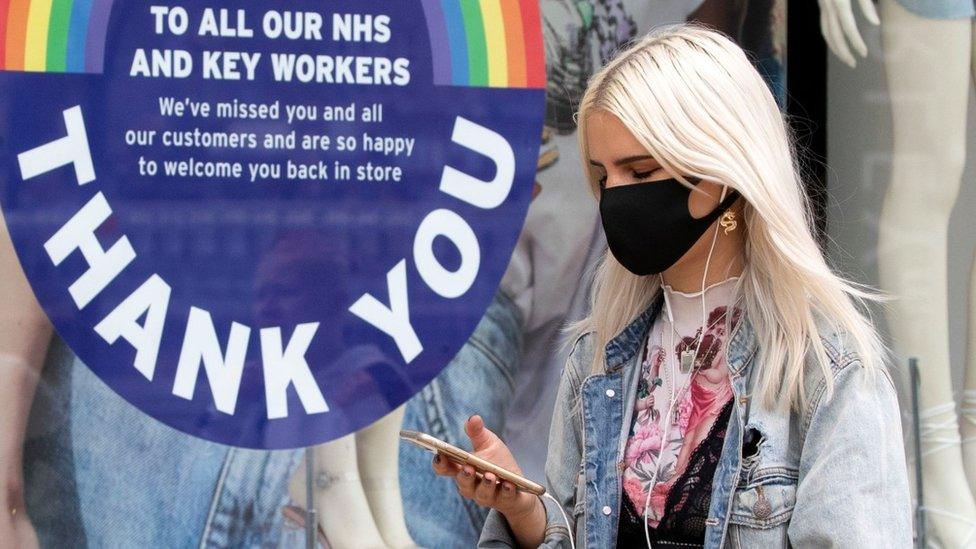
Face coverings became compulsory for shoppers in Scotland on 10 July
While the government is still advising people to follow the 2m physical distancing rules, some exemptions will allow it to be reduced to 1m in shops and on public transport.
The wearing of face coverings - which was already compulsory on buses, trains, trams, planes and taxis - became mandatory in shops from 10 July.
On Monday, non-essential shops inside shopping centres reopened and children and young people were able to play organised outdoor contact sports from the same date.
Dentists are now able to offer some routine treatments, such as examinations, hand scaling and extractions, but are not yet able to carry out aerosol procedures - those which produce a fine mist, like the use of a high speed drill. That will rule out most fillings, crown preparations and treatments involving a water spray. Optometrists have begun expanding their services.
What restrictions have still to be lifted?
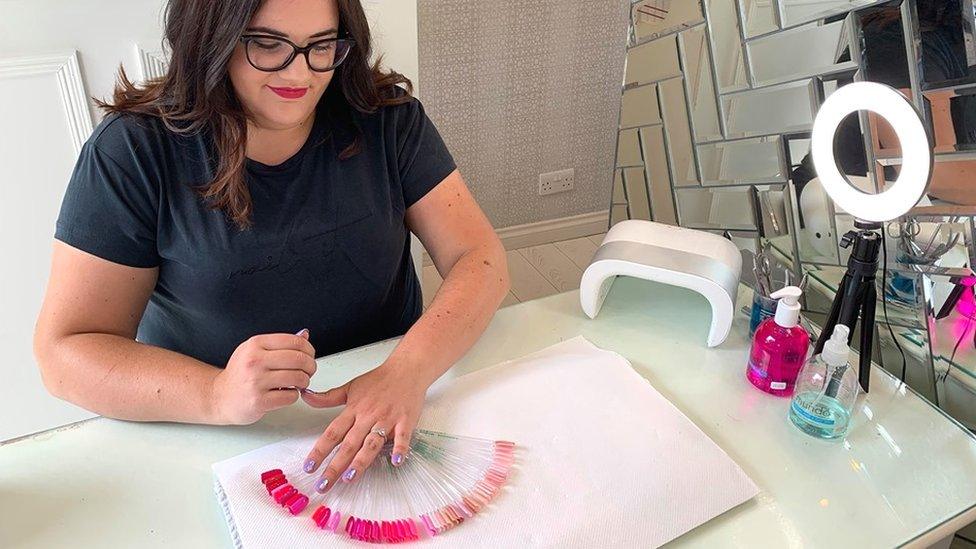
Beauty therapist Rachel Lawrence told BBC Scotland she is looking forward to getting back to work later this month
From Wednesday 22 July, beauticians and nail salons will be able to reopen with enhanced hygiene measures.
Universities and colleges will be able to introduce a phased return to on-campus learning, as part of a blended model with remote teaching, from the same date.
A number of other activities remain under review and are unlikely to resume before 31 July.
These include indoor entertainment such as nightclubs, bingo, theatres, and music venues; the return of live outdoor events; indoor gyms; and the reopening of non-essential offices and call centres.
Schools have already been told to prepare for pupils to resume full-time study from 11 August.
First Minister Nicola Sturgeon said it was expected that Phase 3 might last longer than three weeks.
The outcome of the next formal review is due to be announced on Thursday 30 July.
What's happening elsewhere?
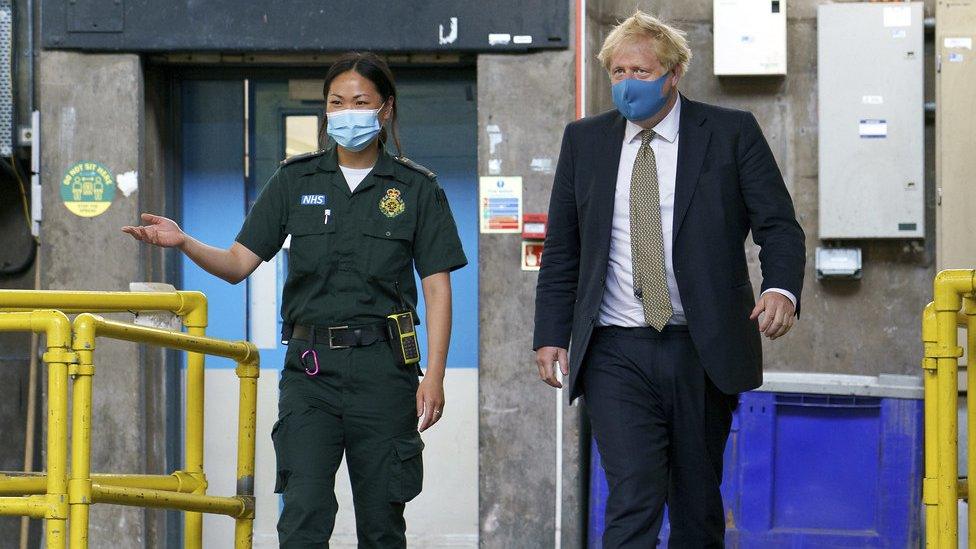
Prime Minister Boris Johnson has been seen wearing a cloth face covering in recent days
Restaurants, pubs and cafes have been allowed to reopen in England since 4 July, along with holiday accommodation - including hotels, B&Bs, cottages, campsites and caravan parks.
Hairdressers have also reopened, as have libraries, community centres, bingo halls, cinemas, museums, galleries, funfairs and theme parks, children's play parks and amusement arcades.
Professional football has also resumed behind closed doors.
Nightclubs and casinos remain shut, along with bowling alleys and soft play centres, while theatres and concert halls will not be able to host live performances.
But indoor gyms, swimming pools and sports facilities can reopen from 25 July.
On Tuesday, the UK government announced wearing a face covering in shops and supermarkets in England is to become mandatory from 24 July.
Those who fail to comply with the new rules will face a fine of up to £100.
Hotels, pubs and restaurants have already reopened in Northern Ireland but the hospitality sector will not reopen in Wales until 3 August, providing coronavirus cases continue to fall.
Social distancing guidance also changed in England, from two metres to ''one metre plus''.
This means that where it is not possible to stay 2m apart, people should keep a distance of at least 1m while observing precautions to reduce the risk of transmission.
Northern Ireland has also announced it will reduce the distancing rule to 1m with restrictions. Exemptions will also be made to Wales' 2m distancing law, with businesses that cannot meet it expected to take precautions.

THE R NUMBER: What it means and why it matters
LOOK-UP TOOL: How many cases in your area?
